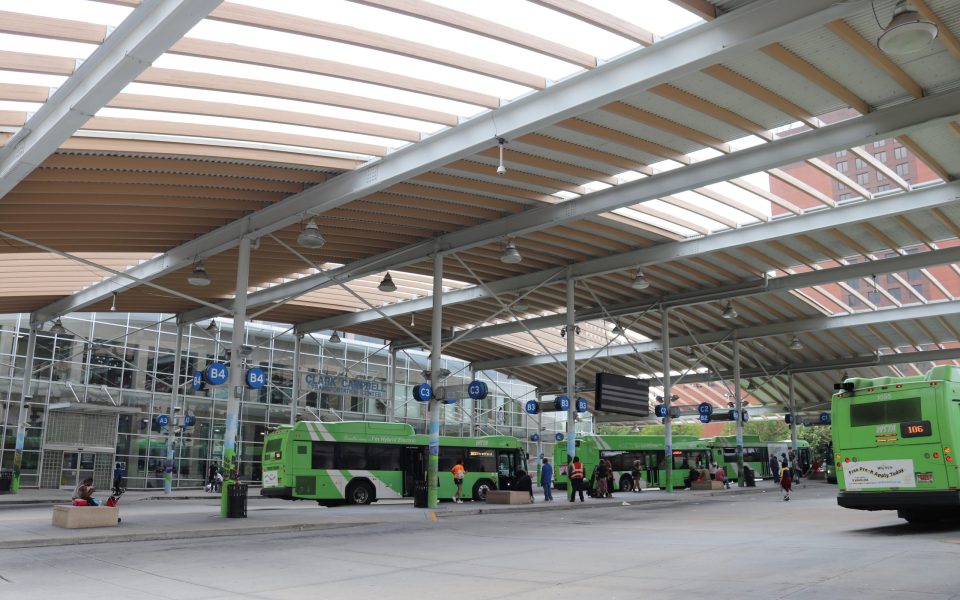Winston-Salem Transit Authority’s new rules officially went into effect on Friday.
According to a press release from the city, WSTA updated its code of conduct in an effort to “focus on safety for passengers, staff, security officers and law enforcement who visit the Clark Campbell Transportation Center.” The transportation center is located downtown at 100 W. Fifth St. In January, all center visitors will be required to pass through a screening station and metal detectors.
Members of city council signed off on the new rules on Oct. 16, but these changes have been in the works since June. According to the city press release, Assistant Director of Transportation Kelly Garvin said that this is the first major update to the code in more than 25 years.
Various factors have created an unsafe environment for the staff that operates WSTA and its passengers, Garvin said.
During a June 12 public safety committee meeting, WSTA’s General Manager Donna Woodson brought up “complaints and concerns,” not just from transportation center staff, but from “citizens who want to utilize the bus services” and are “not able to because they don’t feel safe.” During the meeting, Councilmember Annette Scippio asked if “riders” or “non-riders” had been the source of the issues Woodson talked about. Woodson responded that the “majority of the time they are non-riders” who are “there for hours and hours.”
Many of the city’s unsheltered population take refuge in and around the downtown transportation center, according to previous reporting by Triad City Beat. It has restrooms; there are places to sit; it’s warm in the winter and cool in the summer. As of Jan. 23, there are 468 known houseless individuals — 301 sheltered, 167 unsheltered — in the city.
To help those in need, WSTA staff has started hosting a monthly resource fair at the Clark Campbell Transportation Center on the first Wednesday of every month from 1-4 p.m. on the Fifth Street side of the facility. Community service vendors such as the BEAR Team, Second Harvest Food Bank and Winston-Salem Bike Patrol have attended the previous resource fairs. The next fair will be held on Dec. 6.
In October, WSTA brought their proposed rules back to council. The city’s Director of Transportation Jeff Fansler shared these new rules with city officials.
The updated code of conduct states that security officers may ask people to show their bus ticket and valid identification, and passengers and visitors may not remain at the transportation center longer than 90 minutes.
“You can still come in and use the space,” Fansler said, but added that the policy “basically allows us to identify who has a purpose in the building.” However, the rule doesn’t apply to those waiting for Piedmont Authority for Regional Transportation, Sunway Charters or Barron buses.
Pets — save for service animals — are not allowed at the transportation center or on the buses. One of the rules states that “no running or horseplay” is allowed in the center or on any WSTA vehicles.
The city states that people who violate the code may be banned from WSTA vehicles and properties, and could be arrested.
In addition to WSTA’s rules changes, their ban policy has been updated as well.
Public drunkenness, “excessive profanity” and disorderly conduct including verbal altercations will result in a seven day ban from WSTA’s vehicles and property.
Profane, violent, lews or “boisterous” language or behavior, harassment and sexual harassment, stalking, loitering, public impairment, panhandling, peddling, larceny and “unsanitary issues” will result in a six month ban from the transportation center and the building’s rear parking lot as well as the bus bays.
A permanent ban may be imposed if a rider engages in indecent exposure or physical assault against any WSTA employee, contracted vendors or city officials. Violent, disorderly and threatening conduct as well as any “felonious activity” and continued minor violations will result in a permanent ban from the transportation center, its bus bays and parking lot.
Take a look at the new code of conduct here.
All CityBeat reporting content is made possible by a grant from the NC Local News Lab Fund, available to republish for free by any news outlet who cares to use it. Learn More ↗
Republish this storyJoin the First Amendment Society, a membership that goes directly to funding TCB‘s newsroom.
We believe that reporting can save the world.
The TCB First Amendment Society recognizes the vital role of a free, unfettered press with a bundling of local experiences designed to build community, and unique engagements with our newsroom that will help you understand, and shape, local journalism’s critical role in uplifting the people in our cities.
All revenue goes directly into the newsroom as reporters’ salaries and freelance commissions.


[…] December, the transit authority combined their code of conduct and ban policy into one document and altered some of the rules. The “most […]